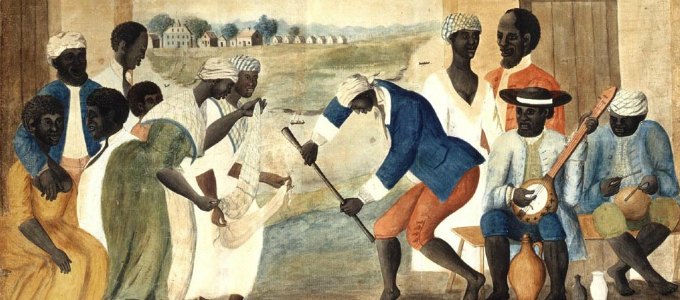("The Old Plantation," anonymous folk painting circa 1790, courtesy of Wikimedia Commons.)
A few days ago, one of my co-workers forwarded me a Vox article written by Margaret Biser titled “I used to lead tours at a plantation. You won’t believe the questions I got about slavery.”
Even in the midst of all of the other diversity-related nonsense I’m privy to on an almost daily basis, what I read blew my mind. I mean, I was shaking my head so hard and so often that I gave myself a headache. Okay, I may have already been brewing one, but this definitely pushed me over the edge.
And I didn’t even want to read the article. Who would? Slavery’s over, right? No. Sadly, it’s not. Its residue lingers like a bad fart, and it has far reaching economic, social and political ramifications on minorities that resonate like a gong today.
Still, I would never in a million years have thought that people’s aversion to any discussion of slavery might stem from Biser’s supposition that “there is a surprisingly prevalent belief out there that slaves’ rations and housing were bestowed upon them out of the master's goodwill, rather than handed down as a necessity for their continued labor — and their master’s continued profit.”
It’s like, really? You thought slavery was somehow good because maybe the slaves stumbled upon American shores and were taken in out of the kindness of their master’s heart? Did the word slave not provide enough of a clue as to the real nature of the situation?
In the piece, Biser also pointed out people’s tendency to think that being a house slave was better than a field slave. As though one can somehow parse out the degradation and make it less so with a geographical distinction:
“Folks would ask me if members of the enslaved household staff felt ‘fortunate’ that they ‘got to’ sleep in the house or ‘got to’ serve a politically powerful owner … Relatedly, many guests seemed to think that the only reason to seek liberation from household slavery was if you were being beaten or abused.”
This language really bothers me. The way these people phrase their questions, whether the questions are genuine or not, suggests they think the slave got something for nothing. I am sincerely not just baffled but also troubled that there are people in this country, in the states where plantations are still standing, who are so ignorant of the history of our country.
How can this be? Is our educational system that flawed? Or is it a case of willful blindness, this stubborn refusal to understand why black Americans are suffering from the legacy of pain that follows a crooked but very real line from slavery?
Biser also said many plantation visitors were surprised when they learned house slaves wanted to escape. “They lived in a nice house here, and they weren’t being beaten. Do we know why they wanted to leave?” These folks were seeing the evil of slavery primarily as a function of the physical environment and the behavior of individual slave owners, not as inherent to the system itself,” Biser wrote.
I don’t get that.
Let’s take the issue outside of slavery and look at it more generally. If you — any of you, regardless of color or gender — were being held against your will, forced to do things you didn’t want to do, forced to accept any kind of treatment in an uncomfortable alien place where you had no voice, no opinions and no hope of a better life for you, your family or your children, wouldn’t you want to leave?
Too many people seem to think black Americans should be happy to accept crumbs. Like, it’s OK if we don’t have much because we should be grateful to have anything at all. Pardon my French, but that’s bullshit. Accepting what one is given might be an option if we’d volunteered for slavery, but we didn’t.
Africans didn’t ask to come to America. They were forced, coerced or tricked into doing so. And once they got here, they did not volunteer to be horrifically abused, worked near to death and forced to couple to breed more slaves to make plantation owners more money. They did not volunteer to have their families ripped apart; to be raped, killed, tortured, kept from any kind of education; or to have their native cultures forcibly stripped from them along with most of their pride, self-worth and a good deal of their sense of community.
Biser made several excellent observations, and I would encourage you to read this piece if you have any questions at all about slavery or are curious about current misconceptions about it. Logically, she surmised that the justifications of slavery she ran into during the tours were white Americans attempt to avoid feeling guilty over the past:
“After all, for many people, beliefs about one’s ancestors reflect one’s beliefs about oneself. We don’t want our ancestors to have done bad things because we don’t want to think of ourselves as being bad people. These slavery apologists were less invested in defending slavery per se than in defending slave owners, and they weren't defending slave owners so much as themselves.”
I get that; I do. I just don’t care.
I do not want to be treated like the descendant of an American slave. It’s old and played, and it’s time to get with the new program. I want to be treated like a fully functioning citizen who is entitled by law to everything this country has to offer, as long as I am willing to work for it. And by work, I mean work within systems that have been set up to enable fair and equitable treatment.
I’ve always said that slavery was the greatest trick ever played on us. I just had no clue how few people actually understood what I meant.















